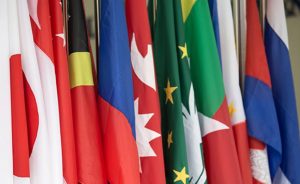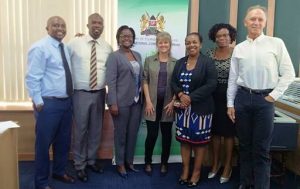Amman, Jordan, April 13, 2020 / travelindex.com / Today Dr. Rifai proposed a draft plan called the HOPE Recovery Plan for African Tourism. He is the President of the Tourism Task Force for Africa, based in Amman, Jordan, while the Vice President of the Task Force is Mr. Alain St. Ange, former Minister of Tourism of the Seychelles. The proposed plan may very well serve as a valid model for the world.
This study is intended to act as a general framework for an economic growth and prosperity plan for countries and governments in Africa and, to localize and adapt to the particulars of each and every country. The main purpose would be to draft a framework for a national plan to assist every country individually to come out stronger economically, socially and, politically, in the “Post Corona Era “. It also tries to position the travel and tourism industry, the most affected and damaged sector by the COVID19 crises, as a leading economic force and for the good of all, for HOPE
Why Travel and Tourism?
Travel and tourism are today and will continue to be for the short and medium-term, one of the most damaged sectors of the economy as a result of the Corona crises. There is no tourism without travel. Travel and movement have stopped completely as a result of Coronavirus.
The fact is that travel and tourism will , as always , bounce back , even stronger . Travel today is no more a luxury for the wealthy and the elite, it’s a people to people activity. It has actually moved into the realm of rights,
my right to experience the world and to see it.
The Human Right of Travel
– My right to travel for business, for education
– My right to relax and take a break.
– It has become today a “ human right “, just as my right to a job, to education and health care, my right to be free in what I say and how I live. Travel and tourism have been elevated in the last decades to no less thank an essential human need.
– A “ Human Right“
– Travel and Tourism will bounce back
Why Africa ?
Today Africa is watching the word struggle with Coronavirus from a relatively distant, so far. It is watching and observing an advanced and developed world incapable of facing up to the challenge of a rather simple medical crisis.
Africa was for a Long time a victim of greed and exploitation. Iit never looked down at other recess, it was never part of this material and the insensitive world. It, therefore, has a unique opportunity to present to the world a different road map.
This may just be Africa’s moment in history.
Africa is also consisting of 53 national entities, relatively small developing countries. Solving their economic challenges should, therefore, not come at a huge cost by international standards. Africa can, therefore, become a model for many developing countries around the world.
We must start by acknowledging first that the world after Coronavirus will be very different from the world before.
The challenge for the travel and tourism sector is how to contribute and lead the transformation of the entire society into an economic new era, the post Coronavirus era.
The health of the entire economy is the only way for our sector to grow and benefit. A challenge that is not only capable of carrying us to a healthy recovery but rather moving us into a whole different world, a more advanced and prosperous world, a better world.
We must turn this terrible episode into an opportunity.
This crisis has two distinct phases;
1) The containment phase, which should and is dealing with the immediate health challenges of the day, keeping people alive and healthy, by applying all lock-in measures.
2) The recovery phase. The preparation of which should guarantee not only dealing with the serious effects of the crisis on the economy and on jobs but, rather take us into recovery to a more advanced form of prosperity and development.
While the two phases are crucial and are to be addressed immediately, the world has so far, put all its energy and resources into phase one – containment only.
Maybe because, understandably, life and health are human priorities but this report wants to draw attention to the fact that, life after phase one, containment, is equally important.
It must be a life with dignity and prosperity. We should therefore start preparing and planning for the day after containment immediately and without any delay.
There is a cost for everything, for every phase and we should prepare ourselves for that.
The cost of containment is clear and every country has taken their measures to address this phase and in turn, the cost associated with it, each according to its capability.
While some governments, particularly in developing countries, have done a good job in containment, most governments have not even started to address phase two.
In view of the enormous damage that phase one of containment, particularly the lockdown, will inflict on phase two (recovery), we must right now start planning and preparing for phase two and its cost.
Plan Hope
Plan HOPE, therefore, is an attempt to address the crisis, to address today’s recovery plans for tomorrow, the estimated costs and the possible resources needed.
The US-Congress approved recently the allocation of $2.2 trillion, which represents roughly 50% of its annual budget and 10% of its GDP, to address the consequences of the crisis. They will be used for the following purposes:
1 – Direct payments to workers losing their jobs and their families, depending on the size of the family
2 – Creating a fund for rescue and bailout for businesses and companies, many in the travel and tourism industry, including airlines, cruise companies, travel agencies, and tour operators. )
3 – Support of the national budget to further reduce taxes on fees across the board , particularly in services and digital technology sectors.
4 – Support the national budget to complete all measure related to medical containment and help in the gradual opening up of the economy.
Singapore, South Korea, Canada, China, and many other countries, including some African countries, made some similar moves. Almost all allocated between 8 – 11% of their GDP for similar plans. It is, therefore, suggested that an estimated 10% of GDP is a reasonable amount to allocate for each and, every country in Africa.
The overall framework can, therefore, look like this,
1 . Each African country should allocate roughly 10% of its GDP for Recovery Plan HOPE .
2 . The allocated funds can be used and divided into two parts
A. 1/3 of the funds for direct support of the annual budget of 2020 to make up for the losses incurred in the containment phase and prepare for recovery. This should ideally Include:
1 . Direct cost of medical measures for containment
2. Subsidizing the workers that lost their jobs as a result of
the containment measures, particularly tourism workers
3. Creating a “Hope Fund “, to support businesses particularly SME ‘s and providing low-interest loans
4. The cost of reducing taxes and fees as part of stimulating
the national economy.
B . 2/3 of the funds for the initiation of a number of infrastructural projects . In all sectors such as, schools, clinics, roads and highways, airports and ports, among other infrastructural needs. This would help achieve:
1 . Stimulating the national economy by pumping fresh money.
2 . Putting more people back to work, and creating new jobs.
3 . Realizing infrastructural projects that are needed anyway.
4 . Increasing the collected revenues to support the budget.
5 . Carving a model that can be applied after recovery.
6 . Full recovery into a more advanced economics
7. The funds should ideally be allocated from savings if not then borrowing at a low-interest rate is the other option. Borrowing is legitimate here, even if the national debt rate exceeds 100%. We borrow to pump money into the economy, stimulate and strengthen the economy and, in turn, boost the revenues of the national budget, increasing the country’s ability to pay back the debt. We do not borrow to pay back our previous debt, rather, we borrow to stimulate the economy by pumping in money, by more spending.
8. A list of relevant projects should be prepared immediately, an average of $1 billion allocated funds should be enough to realize 100 projects at an average of $10 million per project. Such projects are critical to stimulate the National Economy, but are essential to provide the needed infrastructure to enable governments to provide all necessary services to people and businesses, including travel and tourism services.
9. A paper on the proposed tax and fees reduction should be prepared immediately as a tax reform that would continue after the recovery.
The cost on the regular national budget should be calculated from (2A4 ) above assuming that the cost will have to be accounted for during 2021 and maybe 2022. After which the freshly recovered economy should be able to take care of its budget needs, as more revenues will be collected.
As a result of the economic recovery, it will be able to support the regular national budget.
These ideas are general thoughts and meant to be a framework proposal. They are not meant to be followed blindly.
The important thing, for each and every African country, is to design, develop and adopt a specific plan, based on the specific situation in each country and, do it now, today, not tomorrow
We need to work on a country by country approach.
No one HOPE plan can fit all. The new post-Coronavirus era has rendered many International Organizations irrelevant.
Even Regional Organizations cannot and, should not generalize on the entire region. Every country has to be dealt with independently
The new post coronavirus era has indeed produced a new reality, a new world.
Some of the new anticipated features of the New Era, it’s economic consequences and particularly their impact on the travel and tourism industry. It will have an impact on travel and tourism. Most importantly would be a rise in importance of domestic and regional tourism and, as a result, the need to adjust our tourism promotion plans and travel and tourism strategies altogether.
Some of the other possible changes could be
1 . A highly-automated production infrastructure will save energy and not only lower production costs, but also improve quality. The resulting reduction in human working hours will help us maintain better health, and will allow people to have more free and vacation time, which will, on the long term, stimulate travel and tourism.
2 . Increased confidence in technology, technical performance, and in the online payment sectors are and will continue to change consumer behavior, away from the traditional methods. Business travel and tourism will have to acknowledge and the new reality and adjust the business model accordingly.
3 . There will be a long-term decrease in business travel due to the emergence of video-conferencing tools, with high-net-worth individuals preferring to travel via private jet as opposed to first-class air, causing a big impact on the travel industry.
4. The traditional international system is over. Even regional systems and organizations will have to adjust to the new reality and address the particularity of each country individually. The international system, including the UN system. and its organizations will have to adjust to becoming fairer and juster. This will have a big impact on international tourism organizations such as UNWTO, WTTC and many others.
5. Governments, business leaders, and companies will allocate more budget for investing in healthcare and healthcare products after discovering the gaps in the global system while fighting the coronavirus. This will affect medical tourism. More tech startups will emerge, as well, with creative applications.
6. Trust in local governments in the developing world will increase, due to the strong defensive measures taken to control the pandemic. Central Banks have injected large sums for financial institutions and offered unprecedented exemptions that were not provided before. The perception of developing and small countries, improving tourism promotion and branding opportunities
7. There will be a social change that recognizes the side of life that we might have been too busy to acknowledge before. The international community has joined together in global empathy to stand united. Philanthropic initiatives have been created and humanitarian aid offered as billionaires donated millions of dollars to help save people’s lives. Travel should solidify this global empathy.
8. The positive impact that this pandemic has had on our environment will last. All environmental organizations found out that there had been a drop in nitrogen dioxide in parts of China and Italy in March of 2020. Meanwhile, the Center for International Climate Research in Oslo estimates there will be a 1.2% decline in carbon dioxide emissions in 2020. This will have a great impact on responsible travel and sustainable tourism.
9. The education system will be transformed. With schools closing in 188 countries all over the world, according to UNESCO, home-schooling programs have started to take effect. This has allowed parents to help in developing their children’s skills and discovering their talents. Studying remotely will enable developing countries to improve the quality of education.
10 . Staying home has been an extremely positive experience for many, as it strengthens family bonds full of love, gratitude, and hope. Besides this, it has also led to the creation of entertaining online content that has filled our days with laughter.
This crisis will pass, and we will witness many more positive social, economic, and technological developments all over the world.
For the largest resource on tourism in Africa visit TourismAfrica.org











